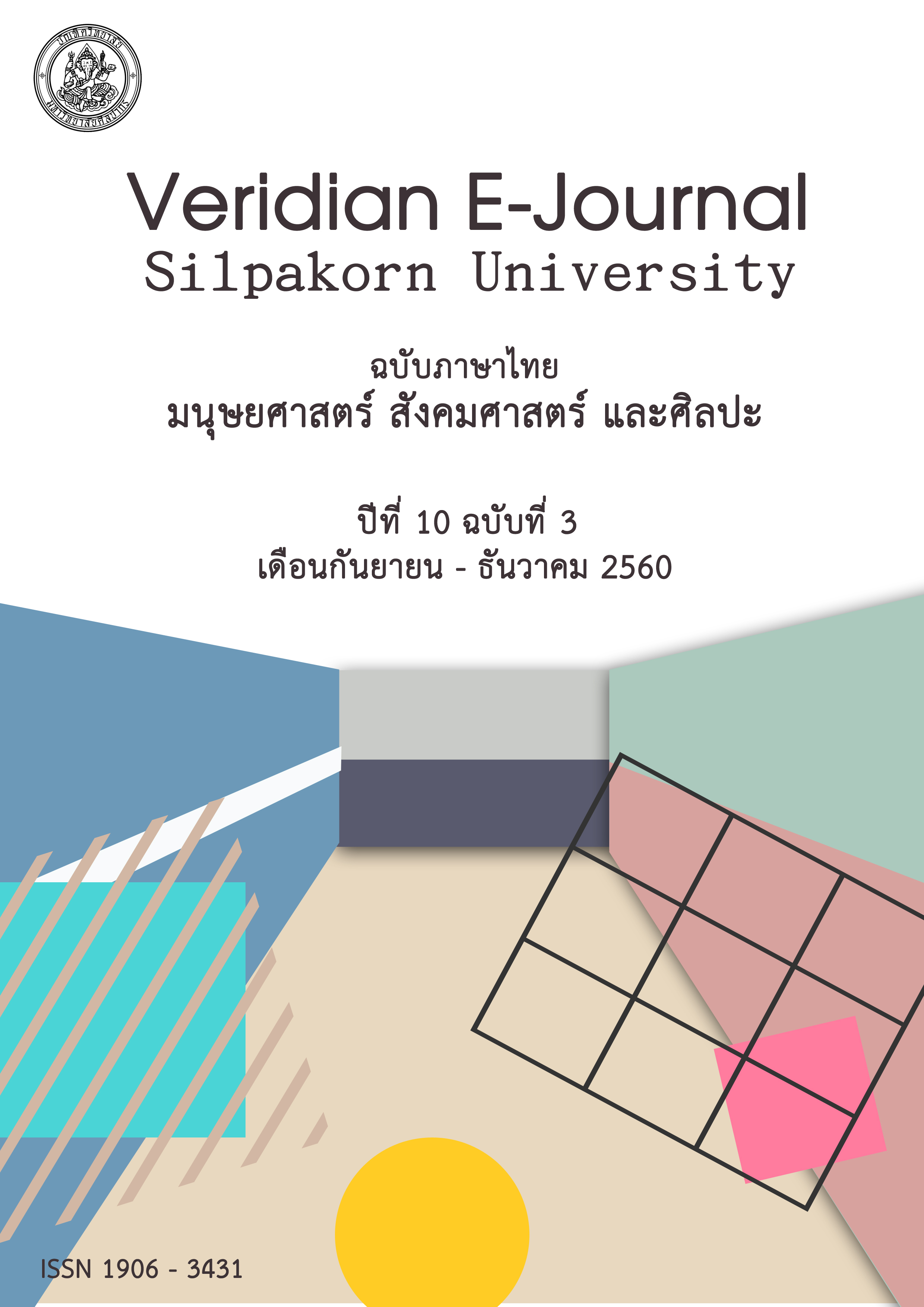การให้ความหมาย ที่มาของความหมาย รูปแบบกิจกรรม และแนวทางการเสริมสร้าง จิตสาธารณะของนักศึกษาคณะบริหารธุรกิจ มหาวิทยาลัยเทคโนโลยีราชมงคลธัญบุรี
Main Article Content
Abstract
การวิจัยนี้มีวัตถุประสงค์เพื่อ 1) ศึกษาการให้ความหมายจิตสาธารณะ และที่มาของความหมายของนักศึกษาคณะบริหารธุรกิจ มหาวิทยาลัยเทคโนโลยีราชมงคลธัญบุรี 2) ศึกษารูปแบบกิจกรรม จิตสาธารณะของนักศึกษาคณะบริหารธุรกิจ มหาวิทยาลัยเทคโนโลยีราชมงคลธัญบุรี และ 3) ศึกษาแนวทางในการเสริมสร้างจิตสาธารณะของนักศึกษาคณะบริหารธุรกิจ มหาวิทยาลัยเทคโนโลยีราชมงคลธัญบุรี เป็นการวิจัยเชิงคุณภาพเพื่อหาข้อสรุปเชิงทฤษฎีที่จะนำไปสู่การสร้างทฤษฎีจากฐานราก โดยการศึกษาปรากฏการณ์ที่เกิดขึ้น ณ คณะบริหารธุรกิจ มหาวิทยาลัยเทคโนโลยีราชมงคลธัญบุรี ผู้ให้ข้อมูลหลักในการวิจัย จำนวน 27 คนใช้การเลือกแบบเจาะจง เครื่องมือที่ใช้ในการรวบรวมการวิจัย ประกอบด้วย การศึกษาข้อมูลเอกสาร การสัมภาษณ์เชิงลึกแบบกึ่งโครงสร้าง การสังเกตแบบไม่มีส่วน รวบรวมข้อมูลและวิเคราะห์ด้วยการวิเคราะห์แบบทฤษฎีฐานราก
ผลการวิจัยพบว่า (1) นักศึกษาให้ความหมายจิตสาธารณะ 7 หมายหมาย คือ 1) การช่วยเหลือผู้อื่นและสังคม 2) การควบคุมตนเองและการเคารพสิทธิของผู้อื่น 3) การกระทำโดยไม่หวังสิ่งตอบแทน 4) การดูแลรักษาผลประโยชน์ของส่วนรวม 5) การเห็นคุณค่าในตนเอง 6) การกระทำที่เกิดจากการมีเจตนาที่ดี และ 7) การมีส่วนร่วมแก้ไขปัญหาและพัฒนาสังคม โดยที่มาของความหมายมาจาก 2 ปัจจัย คือ 1) การขัดเกลาทางสังคม ถ่ายทอดจากสถาบันครอบครัว สถาบันการศึกษา เพื่อน ศาสนา และ 2) ทัศนคติส่วนบุคคล เกิดจากการรับรู้ เรียนรู้ พิจารณาตัดสินใจ และส่งผลออกมาด้วยการปฏิบัติ ซึ่งเป็นสร้างจิตสำนึกในตัวเองหรือการขัดเกลาตนเอง (2) รูปแบบกิจกรรมจิตสาธารณะ 5 ลักษณะ คือ 1) จิตสาธารณะด้านความรับผิดชอบต่อตนเอง 2) จิตสาธารณะด้านความรับผิดชอบต่อผู้อื่น 3) จิตสาธารณะด้านความรับผิดชอบต่อสังคม 4) จิตสาธารณะด้านรับผิดชอบสาธารณสมบัติของส่วนรวม และ 5) จิตสาธารณะด้านอนุรักษ์ทรัพยากรธรรมชาติและสิ่งแวดล้อม และ (3) แนวทางการเสริมสร้างจิตสาธารณะ 5 แนวทาง คือ 1) ด้านการอบรมเลี้ยงดูจากสถาบันครอบครัว 2) ด้านการจัดกิจกรรมและการเรียนการสอนของสถาบันการศึกษา 3) ด้านเหตุผลเชิงคุณธรรมและจริยธรรม 4) ด้านการเรียนรู้พฤติกรรมด้วยตนเองและจากผู้อื่น และ 5) ด้านการรับรู้ความมีคุณค่าและความสามารถของตนเอง
The purpose of this research was 1) to study the definition and source of meaning of public mind of students of Faculty of Business Administration Rajamangala University of Technology Thanyaburi 2) to study the activity format of public mind of students of Faculty of Business Administration Rajamangala University of Technology Thanyaburi and 3) to study the guidelines for the creation of public mind of students of Faculty of Business Administration Rajamangala University of Technology Thanyaburi. It is a qualitative research to find theoretical conclusions that has led to Grounded Theory. The researcher accessed to study and collected data to interpret the existence of the phenomena of Faculty of Business Administration Rajamangala University of Technology Thanyaburi with 27 key informants in the research used a specific selection. The tools used to collect the research composed of study document information, In-depth interview, Use semi-structured semi-structure interview, non-participant observation. Data collection and analysis with Grounded Theory analysis.
The results of this research showed that the students give meaning to public mind seven meanings: 1) helping others and society 2) self-control and respect for others 3) Action without hope 4) maintaining the benefits of the community 5) self-esteem, 6) Action with good intentions, and 7) Participation problem solving and social development. The source of meaning comes from two factors: 1) socialization received by family institutions. Institutions, friendships, religions, and 2) personal attitudes born of perception, learning, decision-making and the results came out with practice. This is a self-consciousness or self-purification. There are five activity format of public mind: 1) public mind of self-responsibility 2) public mind of responsibility towards others 3) public mind of social responsibility 4) public mind of public domain responsibility and 5) public mind of conservation of natural resources and environment. There are five guidelines for the creation of public mind: 1) family parenting 2) teaching and educational activities 3) Moral and ethical reasons 4) self-learning behavior and from others and 5) perception self-esteem and self-efficacy.
